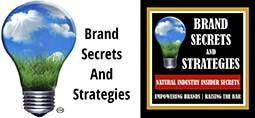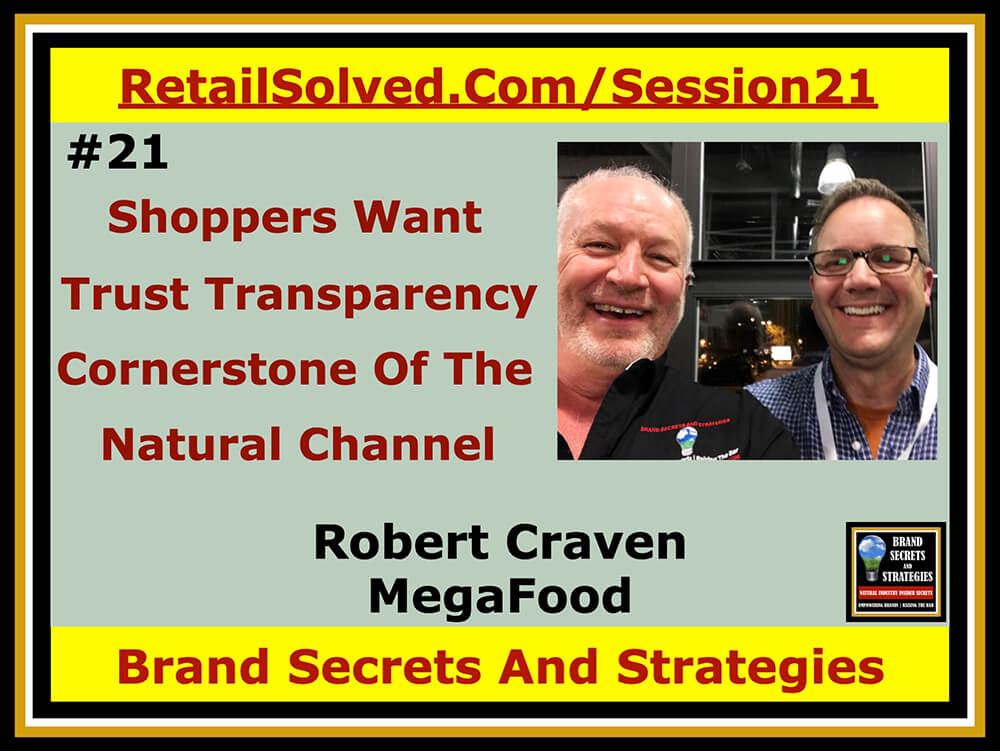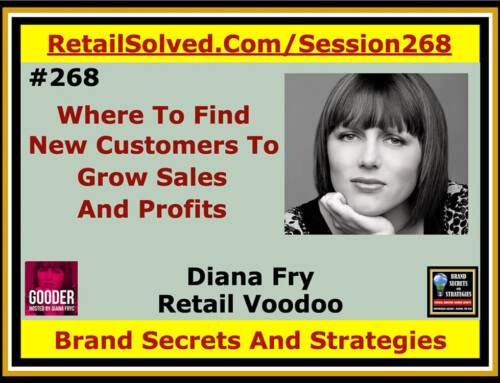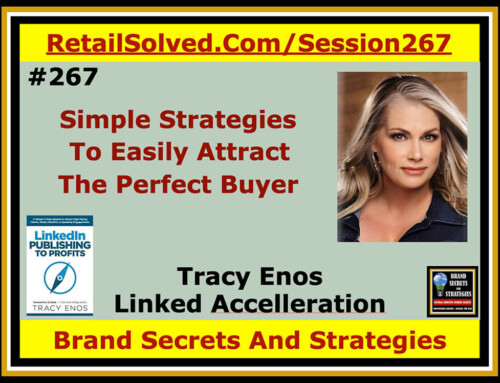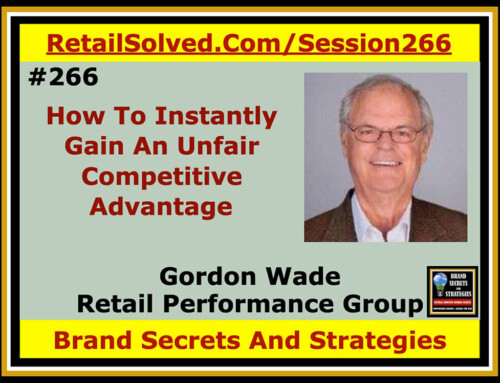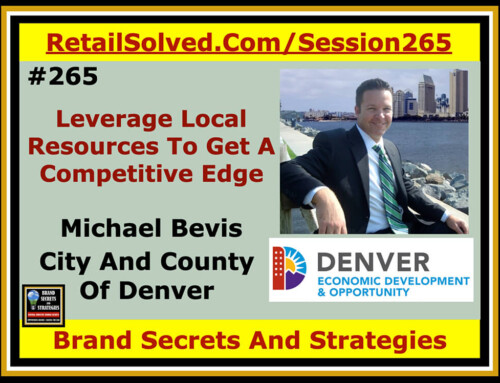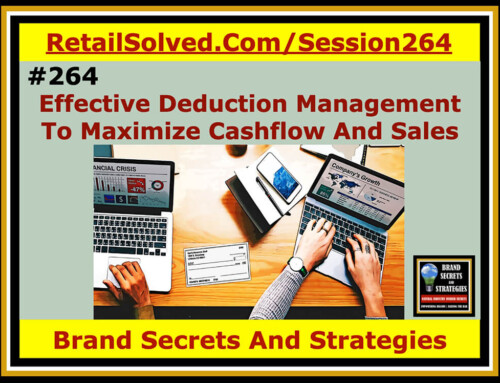Shoppers want what they want and they want products they can trust. Natural brands are built on delivering exceptional value to their customers. Transparency and authenticity are at the heart of their success. Learn tips and strategies from an industry thought leader who continually challenges his employees, natural brands, and natural retailers to raise the bar and change the world – for the better.
Natural shoppers appreciate and respect purpose-driven brands that focus on their needs and wants. The natural channel is the R&D of the CPG industry. Natural brands thrive on true innovation and inspiration. Some brands more so than others.
At the beating heart of the brands that are driving real change in our industry are the CEO’s that inspire that innovation and deliver the quality solutions that appeal to shoppers needs. Corporate culture is where the change really begins. Storytelling helps brands communicate their shared vision and their inspired mission. Learn from a brand that excels in educating consumers and retailers on the importance of quality nutrition.
Today's guest is a self-proclaimed “raging idealist”. Robert Craven is the CEO of MegaFood. MegaFood continues to raise the bar in its effort to erase nutritional poverty. Hear about some of the different initiatives they are involved in including their Big T Transparency project, their farm to table partners, and much more.
Download the show notes below
Click here to learn more about MegaFood
BRAND SECRETS AND STRATEGIES PODCAST #21 Hello and thank you for joining us today. This is the Brand Secrets and Strategies Podcast #21 Welcome to the Brand Secrets and Strategies podcast where the focus is on empowering brands and raising the bar. I’m your host Dan Lohman. This weekly show is dedicated to getting your brand on the shelf and keeping it there. Get ready to learn actionable insights and strategic solutions to grow your brand and save you valuable time and money. LETS ROLL UP OUR SLEEVES AND GET STARTED! Dan: Welcome. Today I am excited to introduce you to one of my favorite thought leaders in the natural channel. He's Robert Craven, the CEO of Mega Food. I've had the privilege of, not only supporting Robert as a client, but working with him as a friend. Robert, and his entire team at Mega Food are so inspirational. You're gonna love their message. They continue to raise the bar, and to raise the consciousness of the community, the natural community, that is. For this reason, I've been looking forward to sharing his insights. As well as how he's working hard to raise the bar on natural. This show is dedicated to natural brands. Think of it as natural products accelerator. An opportunity for you to come and learn from some of the top minds in the industry. Robert is one of the top leaders in our industry, and I know you can learn a lot from him. Here he is. Robert, thank you for joining me today. I really appreciate your time. Let's start out by you sharing a little bit with the audience about yourself. Robert: Well, my name is Robert Craven, I'm the CEO of Mega Food. I'm really, truly blessed to be in a position where I get to operate around my vision and mission on earth each and every day, surrounded by amazing people here at Mega Food. I've got a background with companies like, Procter and Gamble, and Boston Scientific and Strategic Consulting. I was also the CEO of Garden of Life during their run up in the early 2000s and was the CEO of a company called New Organics with Jethren Phillips, the founder of Spectrum Organics, Spectrum Oils, dressings ... Learned a ton from him. So, I'm sort of unique in that I've spent time in retail CBG, like mass CBG, through Procter and Gamble brands like, Bounty and Tide, the big brands, so big CBG. Spent a lot of time in the supplements base for Garden of Life, and with now, Mega Food. And I've also spent a lot of time on the food side. So I actually ran a company with Jethren that supplied organic raw materials, organic commodities to companies like Nature's Path, and Petaluma Poultry, all organic soy from all over the world, and wheats and things like that. So, I've been dealing with food, farmers, retail, CPG for many, many years. I was truly blessed back in 2011 to drop here in New Hampshire with Mega Food, which is really a culmination of all that. Great food, farmer relationships, amazing supplements. Dan, you know Mega Food was the original whole foods supplement back in 1973. And so, really, really love my job and really blessed to be where I'm at today. Dan: Thank you for that, and again, it's a privilege to have you on the show today, and it's a privilege to be able to work with you and support you. Thank you for all the opportunities to learn so much more about the brand. I'd like to start out by unpacking a little bit about the quality of nutrition. Why is it so important? If you are what you eat, then why is it so important for someone to take the right supplements? Can you also share, Robert, a little bit about the differences between say a Mega Food whole food supplement and something that is synthetic. Where I'm going with this, without embarrassing any companies or mentioning any names, I remember when I was there, you showed me, you and your team showed me a supplement that had not metabolized in the body after several days. You had to eat it with food et cetera, but yet, when you eat a whole foods supplement prepared the way you guys make it, you get all the rich nutrients that you would hope to get if you ate the product, the food itself. Robert: Yeah. Well as you know, Dan, supplement deficits in the US and around the world is a well-known fact. The CDC recently did a study that outlined that there are millions of people in the US frankly deficient in things like vitamin D, vitamin C, the various vitamin Bs, and all these nutrient deficiencies lead to major disease. So that's on the one hand. On the other hand, the food that we're eating today is largely processed, and even when we do buy produce or even organic produce, the quality of the soil just isn't what it used to be, and the soil's what provides all those micronutrients that our body understands and knows how to run on. So, even organic soil isn't the same as it was 50, 60 years ago. Don't get me wrong, organic is great, and we're very supportive of organic, but it's really hard to get nutrition is the point. Without nutrition it leads to death and disease, improper nutrition, and so it's an uphill battle. At Mega Food we talk a lot about being in the business to really cure nutritional poverty. Nutritional poverty has to do with more than just wealth. It has to do with all ages, income levels, gender ... doesn't matter. Most people are nutritionally deficient in some way or another. Most people in the US are frankly deficient across the board and are just not getting what they need to not only operate optimally, but to stave disease, to keep disease away. That's why we do what we do at Mega Food at a high level. I'm not anti-synthetic vitamin. I think if synthetic vitamin is what you need, if you can take a synthetic vitamin and up your nutrient levels, awesome. I think that what the whole foods supplement side of the industry would say ... There are different types of supplements and we fall into the whole foods supplement category, is that when you pair a high quality nutrient like ascorbic acid or vitamin C with everything that makes an orange an orange, and at last count I think they were up to 40,000 different co-factors that make an orange an orange, and one of those is ascorbic acid. When you integrate the right scientifically valid amount of ascorbic acid into that orange and you integrate in such a way that the body recognizes it as an orange, the body not only gets the benefit of all those micronutrients and all the different phytochemical, and what makes an orange smell good. What makes an orange an orange, and what makes it taste good. All those bioflavonoids, all those phytochemical, everything that makes an orange an orange, and you get a scientifically valid level of ascorbic acid or vitamin C, we think that's better. We think the body recognizes that in a way that's more beneficial. I know that many of your listeners have probably taken a vitamin in their lifetime and seen it come out the other end, if you will. Dan: Oh yeah. Robert: It's one of those things where your body's not necessarily assimilating a lot of it. So, a lot of people take more than they need in order to get the body to take some of it. I think one of the things that we hear a lot is with traditional vitamins, a lot of people will complain about stomach upset. If you think about it, they're taking that orange, right, and in the case of ascorbic acid, it's really just sugar and alcohol. It has nothing to do with an orange anymore when it's built in a lab. But, you're trying to distill that orange down to its smallest part, in order to take the smallest part, and we patently reject that. We'd rather take the whole thing as a way to get the body to recognize everything that's good about the orange. Now, at Mega Food we're not trying to deliver a serving of orange. We're trying to deliver an effective dose of vitamin C in the orange. For us, food is about delivery. It's not about serving size. We ascribe to a healthy diet as well. We want to make sure everybody eats and thinks healthy. That's the main difference between an isolated synthetic vitamin and what we do. We integrate that in. We just finished a clinical study with the University of Maryland on our blood builder product. It's a great example of this because iron, Dan, many people, millions of people in the US actually are suffering from low iron. One of the side effects of taking an isolated synthetic iron product is significant side effects including constipation, stomach upset, and cramping, etc. We just did this study with University of Maryland that show with our iron product where we pair that iron with beets and other food complexes and herbs, that there is no stomach upset. The body recognizes those beets, brings in the beets, with it the iron, and all the iron levels, all the great indicators of iron are going up, but you're not getting any of that stomach upset because the body's recognizing that as food. That's really core to what we're trying to from a whole foods supplement standpoint. Dan: I think it's amazing. First of all, I got to praise you on your enthusiasm, your passion. Yet when I was able to walk your halls and talk to a lot of your team members, it seemed like everyone is a carbon copy of you in the sense that we're here for a reason, we're here on a mission. On that note, let me back up a little bit. One of the things that I love about your company and your vision, the way that you set things up, and the way that you measure your success is by lives improved. To me that is such a altruistic, phenomenal measure rather than looking at the balance sheet or the bottom line. That goes right to the heart of what we're talking about right now. What does that mean? Then, how would you use that going back to your iron example just a minute ago? Robert: I mean we talk about our purpose being to really nourish a world that's in nutritional crisis. That's the purpose of why we're here. The result of that purpose is lives improved. We want to improve a life. We want to promote health and wellness. Part of keeping our mission in full view of our company is this concept of promoting lives improved. We have an internal measure that we use that tracks an estimate of how many lives we've improved since 1973, and last year, and this year, etc., and the growth that we're experiencing in terms of lives improved. That's actually live on our website at megafood.com. You can actually see our lives improved scoreboard in the operation's facility. That's just a part of trying to make sure the mission stays front and center. We spend a lot of time focused on building culture, building a great culture. We tend to attract people that love to improve lives. They want to work for a company that's committed to improving lives. A new trend right now is called conscious capitalism or conscious companies. I'd say we qualify from a conscious company standpoint. I consider myself a conscious CEO. Conscious meaning thinking broader than just the revenue and the profit. We really want to improve lives starting with our employees. We do a lot here for our employees in terms of buying CSA shares, and providing opportunities to go train at a gym. We pay for volunteer PTO. We pay our employees to go take 24 hours a year and go volunteer at their favorite non-profit. We try to be progressive on how we treat our employees. We teach them how to eat. We try to help them afford to eat the right kinds of things. So, it starts with our employees and then it kind of comes out from there in concentric circles in terms of rings around now our customers, now our consumers, now our communities, and now our partners. We partner with a lot of great people, farmers in particular; but also great brands where we've integrated our product into their product. It all comes back to this mission of improving lives with a purpose of nourishing a world in nutritional crisis. We just beat that drum as much as we can and that's where the lives improved measure comes in. Dan: I think it's amazing. In fact, it goes back to what I was saying a little bit ago just kind of teasing, is the corporate culture at Mega Food is just phenomenal. It is something to be experienced by anyone. I highly recommend anyone and everyone come and take your corporate tour. We'll get to the big T Transparency portion of this in a moment, but the point being is that everyone there seems to be in lock step and thrilled and excited to be a part of your organization. So, thank you for being such a leader on that stage and on that front. What would you say in terms of ... I guess, what are your goals going forward? How do you plan to step up the bar going beyond that? Then, is there a quote unquote, and I use that term softly, challenge that you would like to give to other brands to really make a strategic difference in their own organizations; because I think that's where change takes place first, as you said. Robert: It's funny you mentioned this, Dan. I stand on the shoulders of giants, right? Because Carl Jackson was the previous CEO and owner of Mega Food before I became the CEO. He poured time and money and attention and R&D into developing what we call the Food State Nutrient Process. We've got these Window Refractance Dryers, and we bring in 750,000 pounds of organic produce a year. We make our own ingredients, and we put them in tablets, and we put them in bottles here in New Hampshire, and ship them all over the world. But, he started that. I stand on his shoulders. He was truly a change the world CEO, and I aspire to be a change the world CEO. For me, I ... It's funny, I just finished a blog on this with some help from my team, and it's all about calling on CEOs to use their platform to, if nothing else, help affect the lives of their employees and help benefit employees in a way that makes their lives better and makes their community better. If nothing else, focus on your employees and your community. Like us, if you have an opportunity to use your products to improve lives, and your products to improve a consumer's well-being or their family's well-being, then double down on that. Right? Build trust and commit to those things in a deep, deep way. You asked about the challenge. The challenge is for all the CEOs out there who are listening in particular, to really find out what your passion is. Then express it through your company in an effort to improve lives, starting with your employees, then your community, then your customers, and spread it out from there. That would be huge. You also asked what's next for us. Where are we raising the bar? We're about to launch our 2018 strategy. It's really a view of 2020 and where we're going. There's a few critical components. As you mentioned earlier, we're considered a leader in the space. Not only were we a leader in terms of launching whole food supplements 40 some years ago, but also in terms of transparency. I'm a big believer that transparency builds trust, and storytelling builds trust. So, in an effort to be transparent, two, three years ago now ... three or four years ago now I think, we launched 24/7 live cameras on our facilities. We post all the results from our audits. A lot of people think the supplement industry is unregulated. Of course, you and I both know it is. FDA, FDC. We've got a third party that comes in and audits us, and we post all those results and what we're doing about it. We post our new product pipeline. Our Gummy Bare All initiative comes to mind where we actually announced almost 18 that we were going to build a Mega Food type gummy with our consumer. We invited the consumer to the plant, they were on our payroll to help get it done. We do Facebook Live on it. We try to be as transparent as we can to build trust. It's really more about trust. Next step for us in terms of strategy and where we're taking this is a couple of things. One, we recently hired a VP of Social Impact. So, Sara Newmark has joined us as our VP of Social Impact to really help us amp up and get more strategic about how we promote social impact starting with B Corp Certification. We should have our B Corp Certification here in March, which I'm really excited about. We've been operating as a B Corp pretty much for the last several years, but finally going to make it official in March with Sara's help. She's also going to help us amp up our place in the market as a leader on all things social impact, especially as results with farmer related issues. Regenerative agriculture, for example. You'll see more of that from us as a major strategy. Dan: Love the fact you're doing that. Actually, that's what's at the heart of this show. Again, thank you for coming on because it's bringing thought leaders like you into this conversation. It is an audio new product accelerator, a brand accelerator, for the most part; but it's trying to basically challenge brands to think more strategically. One of the ... and you're getting to all the core things I wanted to talk about, so thank you for doing that, kind of stealing my talking points. No, no, no. That's fine. The big T Transparency Project, it's amazing. Again, I would encourage anyone and everyone to go on your website and see the 24/7 cameras that are going through the process and how you make it. One of the other things that impressed me is the attention to detail. The type of glass that you use for your packaging. The way you test everything and retest it and retest it. The way the fluid beds work. One other thing that really stood out to me, and if you could touch on this a little bit, a lot of companies buy their ingredients, whole food or wherever they get it, and they put it, together in heat. That causes a lot of the nutrients if you will, to get baked out. Could you share a little bit about that and your attention to detail all along the way? Robert: Sure. I mean, when we think about our products, our goal is to get as close to food as possible. We all know things like heat, air, sunlight, these are all things that can affect food negatively. We go through very extensive ... we take very extensive steps to ensure that we keep our product as close to food as possible. That goes for our Window Refractance Dryers where we keep very low heat. It's a very slow, expensive process to get to our ingredients. I won't go into too much detail on it. There's lot on the website on our dryer process and how we do what we do, but the point is we're trying to keep it as close to food as possible. We're trying to remove the moisture without burning the product or burning off too many of the nutrients. We do a very good job of that as the science behind the drying technology says that it's the technology that maintains the most phytochemicals and bioflavonoids, and the most of the food in the food. It's actually scientifically proven that this drying technology does that. We're very proud of that. At the same time, it's expensive. Our ingredients, if we were to sell them on the open market would be anywhere from 7-12X, 12 times what you would buy another say orange powder for or cranberry powder. It's very expensive process because it is so slow. The reason we do it is to stay as close to food as possible. That's why we use amber glass bottles to keep the sunlight out, keep the air out. That's why we go slow on our tableting process because the faster you go on tableting, the more heat that gets exchanged to the tablet. We go through pretty extensive measures to make sure that our food stays as close to food as possible. Dan: That's great. I appreciate the fact that you're going throughout the process. Again, I encourage everyone to go online and take a look at it. One of the things that you talked about, I want to go back to this because it's something I've really been highlighting on the show, Robert, is your ability or the way that you interact with some of the farms. For example, the way you use Uncle Matt's organic oranges in your process and the way that you co-merchandise ... not co-merchandise, but co-promote him being your advocate or where you're getting your product from, a single source. So my point is building trust not only within the four walls of your operation, but beyond that, and also the other growers and the other farmers that you're using. Could you talk about that for a bit? Robert: It's funny, I listen to a lot of podcasts and one of the podcasts I listen to is Tim Ferris, so I'll give him credit although I don't it's his quote, I think it was somebody else's quote. He likes to say in his podcast that you are the average of the five people you hang out with. Dan: I like that. Robert: That really struck me many, many years ago when I heard that quote. The people you hang out with reflect on who you are as a person, as a CEO, as a brand, as a company; and we like to hang out with really great brands. To the degree that a Uncle Matt's Organic Orange Juice brand, which is by far the premier leader in organic orange juice in the United States, we buy their oranges. We buy his uglies and we put them into our vitamin C powder. We actually use them in our vitamin C, state nutrients and we use them in a variety or our different products, and we put his logo right on the front of a Mega Food bottle. In exchange, he buys our turmeric powder. We make our turmeric powder here in New Hampshire, and he buys that turmeric powder and he puts it in his Uncle Matt's Organic Orange Juice, and he puts the Mega Food logo right on the front of his bottle. We've got not only a working relationship, we've got a very personal relationship. He and I both went to University of Florida. We didn't know that at the time, but we've become great friends. Same thing goes for the Lundberg Family Farms where we use their organic rice. Same thing goes for Stalbush Family Farms up in Oregon. Valley where we use their beets. Same thing goes for small farms like James Lake Cranberries up in Wisconsin. They're a small organic farm and we buy from them. We're proud to support them. And Foxy Farms out of California, kale we put in our B12. These are all relationships that we truly value. It's not just a working vendor relationship, supply relationship. A portion of all the proceeds of the product that each of those farmers' produce are in goes back to the cause of their choice. For example, Uncle Matt's cause is Florida Organic Growers, which is a certifier and trainer of organics down in Florida. We give them a check on behalf of our partnership to represent how important that relationship is to us. We spend a lot of time with farmers and every year we like to add one or two new, we call them Farm Fresh Partners. If you look at our bottle, a bottle of Mega Food, most of them will tell the story of that farmer. Who they are, third generation, their brothers, their sisters, why they got into farming. On our website, we try to take the time to really tell the story of that farmer in a deep way. We think that matters. It gets back to trust. We talk about transparency, providing trust, but also storytelling. I think storytelling is a historic and almost ancient way that way people built trust between family members, between tribes, between communities. Storytelling is a big part of that. We try to be very good at storytelling. Dan: I got to admit, you guys are absolutely the best. In fact, you get up at expo and again, your articles, etc. You do such a great job of really distilling something down and making it very understandable for the lay person as you've done here, so thank you for that. I love going to your talks. You talked about, going to the storytelling part, expanding the messaging beyond the label and that's something you also need to celebrated on. So, a lot of products, what I'm getting at will say, "Here it is, take it or leave it." I'm being a little bit flippant when I say that. You have the technology to go beyond that and not only celebrate local, an example, local Matt, but talk about why it makes sense to put those products in your body, those nutrients, etc.; and your focus on giving back and helping the retailer community understand why your products matter to their core consumers, and helping the retailer drive sales with your products, etc. Can you speak to that a little bit? Robert: Sure. We're big believers that natural retailers and integrative practitioners are really the core. They're really at the center of health and wellness in a community. Most people don't have a relationship with their family doctor, for example, or their primary care physician like they do with the staffer at their local health food store-where they could learn something and feel comfortable and discuss very personal things about their life and about their wellness. Same thing with a great naturopath or integrative physician. We've got an integrative pediatrician here in New Hampshire we use for our kids, for example. Integrative docs are thinking more about what's the root cause and is it sleep? Is it food? What's the root cause of things, not just let me give you a prescription or a Z-pack, you know what I mean? We truly firmly believe that natural retailers in particular, and integrative physicians and practitioners are at the core of health and wellness in their community. We do everything we can to support that effort. Some of the things we do, for example, is we have free shipping, no minimums. A lot of these retailers in particular, and practitioners quite frankly, are mom and pops. You can think about your local chiropractor, a lot of times that's a family run business. Think about your local health food store, that's a family run business. So cashflow, we've learned, can be an issue for some of those mom and pop businesses. In order to help them with their cash flow, we don't require them to buy a certain minimum that might really test them. It might be six weeks worth of product if they buy a certain minimum in order to get free shipping. We're no minimum free shipping, is one way that we help our community retailers. Another thing we do is this concept called iMAP. We're sticklers about pricing our product in a fair way. Unlike other brands that might be on Amazon for 40, 50, or even 60 percent off, you won't find Mega Food on Amazon for less than 28%. That's about the average that we run day-to-day with a retailer. We do everything we can to create this level playing field so that the consumer, the end consumer of the product can decide where they want to shop and buy their product. We're trying to make it as fair as possible for especially natural retailers and integrative practitioners to feel like they can compete, and they can support our brand. We've got sales reps that train them, etc., etc., etc. We go out of our way to do that. We run a local ... I'm sorry, a annual even called Zing Mojo, where we bring natural retailers ... we brought 50 in last year. We bring those natural retailers together to talk about the future of the industry. To talk about strategies, to talk about what does Amazon mean, what does the Amazon purchase of Whole Foods mean. We try to support them in a way to help them run their business. We can understand their business and provide them with what they need to be competitive because we honestly believe that when someone can go and talk to someone in a store, or talk to that doc, or create community around their wellness, they're going to be infinitely more successful than if they just read a website or read a book and jump on the latest diet. It's all about improving lies. It's all about promoting wellness. We think that our customers are pretty core to that. Dan: Absolutely. In fact, again I applaud you for this because you have so much authority in this space. Not just you, but the people that work with you, the people that you associate with, Tieraona Lowdog, etc., Dr. Weil, the community that you've built. I love the way that you put that. I know that we're running up against a hard stop. I wanted to say, first of all, thank you for challenging me to come up with so many creative ways to help you and help you take this message to retail and beyond. The fact that you are being such a champion to other brands, to other CEOs, to other thought leaders, and helping the natural retailers compete in their space, especially with all the competitive threats that they're facing today. What other things would you like to share in our remaining time? You covered a lot. Robert: Yeah, we did. I think that I'm on a mission to improve the world. I wrote in my blog just this week, I'm kind of a raging idealist, and that idealist is someone who really believes to their core that the ideal version of something is possible. To me, the fact that we still have nutritional poverty in this world is a disgrace. I also think it's very solvable. That's my passion, and that's my mission. That's the amazing responsibility that I get to try to live up to every single day with and through Mega Food. I would say that most of the people here at Mega Food would feel exactly the same way. That's our mission. I would just say that if you're listening out there, you've got something in your heart that you're passionate about. It might be cancer, it might be breast cancer. It might be ADHD. It could be anything. It could be water. It could be pollution. It could be recycling. Whatever it is that's on your heart that really touches you and is something that you want to fix, figure out a way to use your role, especially if you're a CEO. There's so much responsibility there. But, even if you're not, figure out a way to use your role, use your time, talent, skill, knowledge and put it to work and do something good. Do something good with it. I got to tell you, I've been doing this CEO gig for gosh, 17 years, and every step along the way, I've been able to express my passion of helping people. It's not about me. It's about being surrounded by amazing people that do that so well, and I just want that feeling for everyone. I want everybody to feel that feeling. Just take some baby steps, man. Spend some time doing it, especially if you're a leader of a company or a division or a department or a team. Go volunteer together. Even a small baby step will give you that feeling. You can just leverage that in a way that'll make people want to work for you, work with your company. Take things to the next level. It's everything. By the way, it'll solve all the world's problems. I would just encourage everybody to get to it. Dan: I agree. I couldn't thank you more. Anyone who's had an opportunity to spend some time one-on-one with you, what a privilege. You can absolutely see your advocacy and your passion. Again, thank you for your time. I really appreciate this. Robert: Thanks, Dan. Appreciate it man. Dan: Again, I want to thank Robert for his time today. For coming on the show. I'll put a link to their website. That's MegaFood.com on my website and in the show notes at BrandSecretsAndStrategies.com/session21. This week's freebie is my retail math cheat sheet. You can get in instantly by texting “retailmath” to 44222, or downloading it on the show notes and on the website. I look forward to seeing you on the next show. This episode's FREE downloadable guide Each of us needs to perform basic retail math calculations but it's not always possible to remember every formula, especially if you don't use them on a regular basis. Here's a quick cheat sheet with some of the most important formulas you need to know. CLICK HERE TO DOWNLOAD YOUR FREE STRATEGIC GUIDE: Retail Math Cheat Sheet Thanks again for joining us today. Make sure to stop over at brandsecretsandstrategies.com for the show notes along with more great brand building articles and resources. Please subscribe to the podcast, leave a review, and recommend it to your friends and colleagues. Sign up today on my website so you don’t miss out on actionable insights and strategic solutions to grow your brand and save you valuable time and money. I appreciate all the positive feedback. Keep your suggestions coming. Until next time, this is Dan Lohman with Brand Secrets and Strategies where the focus is on empowering brands and raising the bar. Enter your name and email address below and I'll send you periodic updates about the podcast. Sign up to receive email updates
Listen where you get your podcast
Like what you’ve heard? Please leave a review on iTunes
FREE Trade Promotion ROI Calculator:
Click Here To Maximize Sales And Profits
Free brand-building resources to help you grow and scale
Turnkey Sales Story Strategies FREE ON-DEMAND COURSE
Why Most Brands Fail – The Roadmap To Sales Success FREE ON-DEMAND COURSE
Essential In-Store Customers First Marketing Strategies FREE ON-DEMAND COURSE
How To Drive Profits With Sustainable Packaging FREE ON-DEMAND COURSE
The Retail Game – What You Need To Know With Bob Burke FREE ON-DEMAND COURSE
Sales Success Begins With A Solid Business Plan FREE ON-DEMAND COURSE
How To Turn Your OnLine Data Into Explosive Sales Growth FREE ON-DEMAND COURSE
2016 Category Management Handbook Page 20 & 21
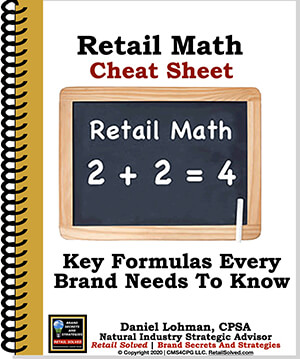
Want A Retail Math Cheat Sheet?
Each of us needs to perform basic retail math calculations but it’s not always possible to remember every formula, especially if you don’t use them on a regular basis. Here’s a quick cheat sheet with some of the most important formulas you need to know.
Empowering Brands | Raising The Bar
Ever wish you just had a roadmap? Well, now you do!
Don’t miss out on all of these FREE RESOURCES (strategic downloadable guides, podcast episodes, list of questions you need to be asking, and know the answers to, the weekly newsletter, articles, and tips of the week. You will also receive access to quick and easy online courses that teach you how to get your brand on the shelf, expand distribution, understand what retailers REALLY want, and address your most pressing challenges and questions.
All tools that you can use, AT NO CHARGE TO YOU, to save you valuable time and money and grow your sales today!
Image is the property of CMS4CPG LLC, distribution or reproduction is expressively prohibited.
